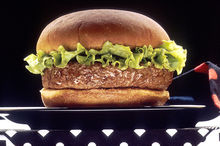Eight horses, killed in the UK, tested positive for the painkiller bute and six may have entered the food chain in France, the Food Standards Agency said. England's chief medical officer said the highest level detected was 1.9mg of bute per kg of horsemeat, which posed "very little risk to human health".

A bit of Bute with your burger
Eight horses, killed in the UK, have tested positive for the painkiller bute and six may have entered the food chain in France.
© 2012 by Len Rizzi
Testing started before horsemeat was discovered in processed beef products. Earlier, food minister David Heath said tests on Findus beef meals found to contain horsemeat were negative.The prime minister's spokesman said the UK was working very closely with the French authorities tracking the carcasses, which were identified on Thursday morning.
FSA rules which came into force this week mean all horsemeat in the UK should be tested for bute before it is allowed to be sold for food.
Tests on a sample of horse carcasses took place over a three-month period last year after intelligence sources suggested bute was present in the food chain. Some six per cent of the carcasses tested positive, prompting the FSA to start testing all horse meat in January.
A total of 206 carcasses were examined between 30 January and 7 February and the eight with bute were discovered. The FSA said six of the horses were slaughtered at LJ Potter Partners at Stillman's in Taunton, Somerset, and were exported to France, where horsemeat is regularly consumed.
The two killed at High Peak Meat Exports in Nantwich, Cheshire, did not leave the slaughterhouse and have been destroyed.
Concerns about horsemeat first came to light on 15 January when tests by Irish authorities found horsemeat in beefburgers made by firms in the Irish Republic and the UK and sold in supermarket chains including Tesco and Aldi.
One estimate suggests 540 bute-treated horses leave UK shores each year, destined for dinner plates on Continental Europe.
While the risks may be low, the risks are still there. The Food Standards Agency says it is unacceptable for any bute to enter the food chain.
Read about Phenylbutazone
